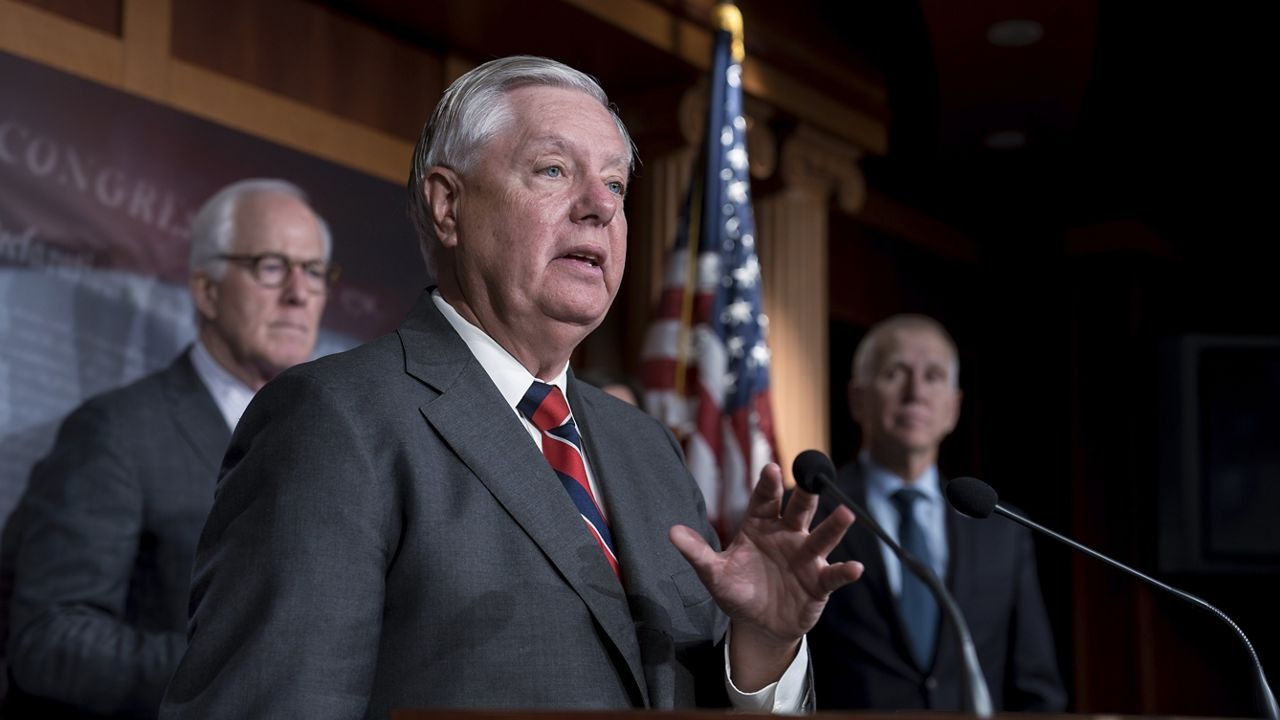Senators are on the verge of voting on a bipartisan immigration deal in the upcoming week, according to statements from one of the primary negotiators. However, the critical hurdle remains the task of garnering support from fellow members, presenting a potential challenge in the approval process.
Senator Chris Murphy (D-Conn.) revealed during a CNN interview on “State of the Union” that the text of the bipartisan deal is nearing completion. While Senate Democrats are anticipated to largely endorse the agreement, there is uncertainty regarding the stance of Republicans in both chambers.
The heightened border provisions may deter some progressive Democrats, while the influence of former President Donald Trump, urging Republicans to resist Democratic victories, further complicates the situation.

Sen. Lindsey Graham, R-S.C., flanked by Sen. John Cornyn, R-Texas, left, and Sen. Thom Tillis, R-N.C., (Credits: NY1)
Senator James Lankford (R-Okla.) defended the deal on Fox News, emphasizing that Republicans initially insisted on tying border policy changes to the national security supplemental. Lankford has faced internal criticism within his party, with some Republicans arguing that the deal would inadvertently benefit President Joe Biden in an election year.
Lankford explained that four months ago, Republicans withheld funding for Ukraine, Israel, and the southern border due to their demand for policy changes. He stressed the need for policy alterations and defended the negotiation process, asserting that Republicans collectively insisted on reshaping existing laws.
Murphy expressed optimism about garnering support from enough Republican senators. He underscored the pivotal decision facing Republicans on whether to align with Donald Trump, who perceives chaos at the border as politically advantageous or to contribute to the passage of legislation that would represent the most significant bipartisan reform of border immigration laws in four decades.
Negotiators clarified that the deal’s terms are not finalized, but it aims to grant the president the authority to temporarily “shut down the border in between the ports of entry” when border crossings reach critically high levels. This authority would remain in effect until a more efficient processing system for border crossers is established.
Lankford dispelled the misconception that the deal would permit 5,000 migrants to enter the country daily, asserting that the focus is on turning people around. He emphasized members’ constitutional obligation to secure the country swiftly.
President Biden urged Congress to pass bipartisan legislation, pledging to implement border shutdowns when the bill becomes law.
Additionally, the bill aims to reduce wait times for asylum-seekers, expedite work authorizations for new arrivals, and empower the Department of Homeland Security with expulsion authority in specific scenarios.
Despite potential Senate approval, challenges loom in the House, where conservative opposition, including House Speaker Mike Johnson, poses a formidable obstacle to immigration reform.
In a letter to Senate negotiators, Johnson asserted that even if the bipartisan deal clears the Senate, it would be “dead on arrival” in the House.
Former President Trump has also criticized the deal, vowing to oppose what he deems a “horrible, open borders betrayal of America.”
He positions himself against the legislation, aiming to deny President Biden a victory on a crucial issue ahead of the November election. Trump dismisses any blame for the discord, stating he would rather have no bill than a flawed one.























